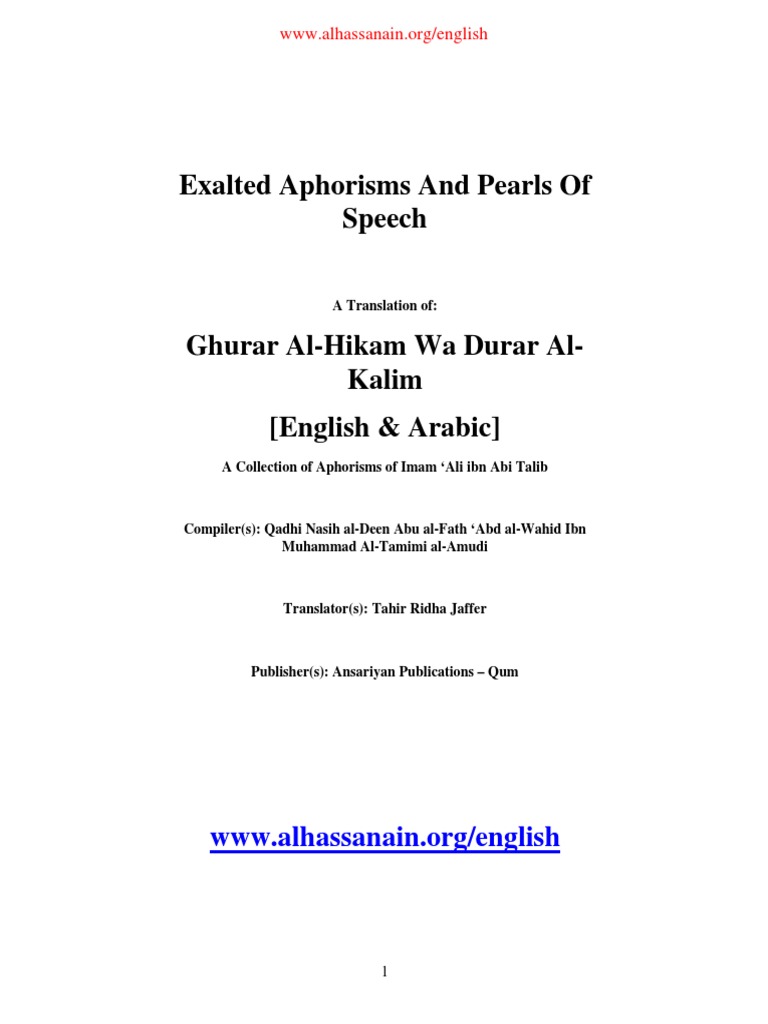The teachings of Shia Islam encompass a diverse array of sources, with a significant emphasis on moral and ethical guidance. Among the pivotal texts within this tradition is "Ghurar al-Hikam wa Durar al-Kalim," a compilation that encapsulates the wisdom of the Ahl al-Bayt, particularly focused on the sayings of the Imams. This compilation serves as a mirror reflecting the profound insights into human conduct, social ethics, and spiritual development.
Have you ever pondered how a seemingly simple phrase can encapsulate an entire philosophy of life? The challenge here lies in truly grasping the depth of these aphorisms. By delving into "Ghurar al-Hikam wa Durar al-Kalim," one is invited not only to read but to reflect, engage, and ultimately apply these timeless principles in the complexities of modern existence.
To embark on this exploration, it is paramount to set the stage by examining the conceptual framework of the text. "Ghurar al-Hikam wa Durar al-Kalim," translated as "The Pearls of Wisdom and the Gems of Speech," is a compendium where succinct aphorisms are infused with vast meanings. Each saying is a testament to the intellectual heritage transmitted across generations, embodying the essence of Islamic thought as propagated by the Imams.
The structure of "Ghurar al-Hikam" is reminiscent of an intricate tapestry where each thread contributes to a greater picture. The text is categorized into various themes, enabling readers to navigate through concepts such as justice, compassion, knowledge, and patience. Such thematic organization allows for both focused study and holistic understanding, inviting the reader to immerse themselves in the richness of Shia thought.
The ethical dimension of the teachings found in this compilation is particularly noteworthy. One prominent theme is the emphasis on justice. The sayings underscore the paramount importance of acting equitably, highlighting that justice is not merely a societal obligation but a divine mandate. These aphorisms instill a sense of moral responsibility, challenging individuals within their communities to uphold fairness in their dealings. How often do we reflect on our actions? The challenge here is to align one's conduct with this call for justice, making it a cornerstone of everyday interactions.
Another striking feature of the text is its emphasis on knowledge. The Imams impart that seeking knowledge is not only an intellectual pursuit but a path toward spiritual enlightenment. This underscores a dichotomy often overlooked: the interconnectedness of knowledge and action. In a world inundated with information, "Ghurar al-Hikam" beckons individuals to discern and prioritize knowledge that fosters ethical and moral growth. The challenge lies in pursuing knowledge not only for personal gain but as a means to serve society and instigate positive change.
Moreover, the aphorisms delve into the realm of emotional intelligence, advocating for compassion and mercy. They remind humanity of the intrinsic value of empathy in interpersonal relationships. The teachings encourage a practice of kindness, suggesting that true strength lies in the ability to forgive and to understand the plight of others. In contemporary society, where division often prevails, this wisdom poses a challenge: how can one embody compassion in an increasingly polarized world? The act of extending understanding can be revolutionary, fostering a culture of dialogue in lieu of conflict.
The notions of patience and resilience are recurrent themes throughout the text. The Imams articulate that trials are an integral part of human existence, positing that enduring hardship with grace cultivates character. In moments of adversity, the challenge presented by these teachings is to remain steadfast, to view life's obstacles as opportunities for growth and self-improvement. This resilience, as emphasized in the aphorisms, transforms suffering into a vehicle for inner strength and spiritual elevation.
Intertwined with the ethical exhortations are reflections on governance and leadership. "Ghurar al-Hikam" elucidates the qualities of an exemplary leader—justice, wisdom, and accountability. Within these teachings lies a call to action for those in positions of authority to lead with integrity, reflecting the Islamic ideal that governance should serve the welfare of the community. However, the challenge extends to the laity: how can individuals hold their leaders accountable, embodying the very qualities they wish to see manifested in governance?
Ultimately, "Ghurar al-Hikam wa Durar al-Kalim" is not merely a collection of sayings but a living document, breathing wisdom into the daily lives of its readers. Its teachings challenge individuals to engage deeply—not only with the text but with the world around them. This engagement can lead to transformative changes, not only within oneself but also within society at large.
As followers reflect upon these aphorisms, the journey towards understanding and embodiment must transcend mere reading. The quest is for an experiential grasp of the principles contained within. Thus, the challenge propounded by this timeless text remains ever-relevant: to sift through the pearls of wisdom and to actualize these teachings in a world rife with complexities. In doing so, one can honor the rich intellectual legacy of Shia thought, fostering a culture rooted in compassion, justice, and understanding.


